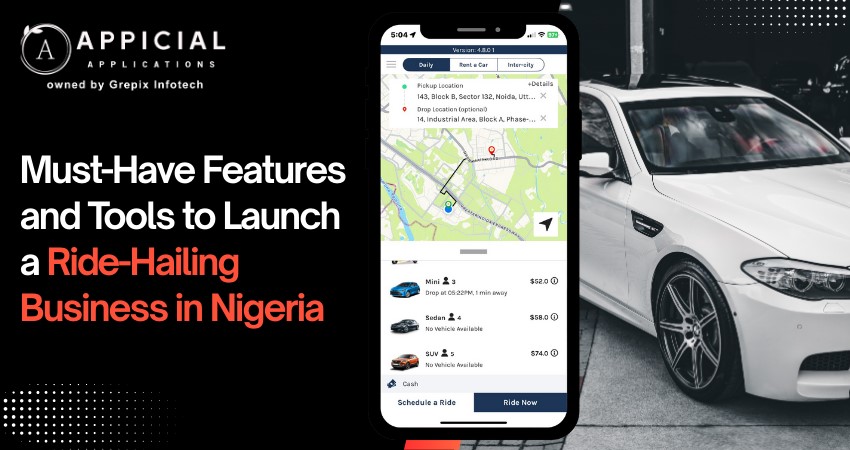
Must-Have Features and Tools to Launch a Ride-Hailing Business in Nigeria
Launching a ride-hailing business in Nigeria requires more than just a fleet of cars and a mobile app. To thrive in a competitive and dynamic market, you'll need a solid tech foundation, user-friendly features, and tools tailored to local needs. This guide highlights the essential features and tools every entrepreneur should consider to build a reliable, scalable, and user-focused ride-hailing platform in Nigeria.
Starting a ride-hailing business in Nigeria is a smart move in today's growing digital transport ecosystem. But success depends on more than just having a mobile app it requires a complete, automated platform. From essential tools like GPS tracking, automated dispatching, and payment gateways, to advanced backend systems for driver management, analytics, and security, every component plays a vital role. Appicial stands out as a leading taxi app development company, offering white-label solutions tailored for entrepreneurs in Nigeria. Their software includes customizable passenger and driver apps, admin dashboards, and legal compliance tools, all designed to streamline operations and maximize performance. Whether you're entering Lagos, Abuja, or any other bustling city, Appicial's platform gives you everything you need to launch fast, grow smart, and dominate the ride-hailing market. It's the most efficient way to start your taxi service and scale it across Nigeria and beyond
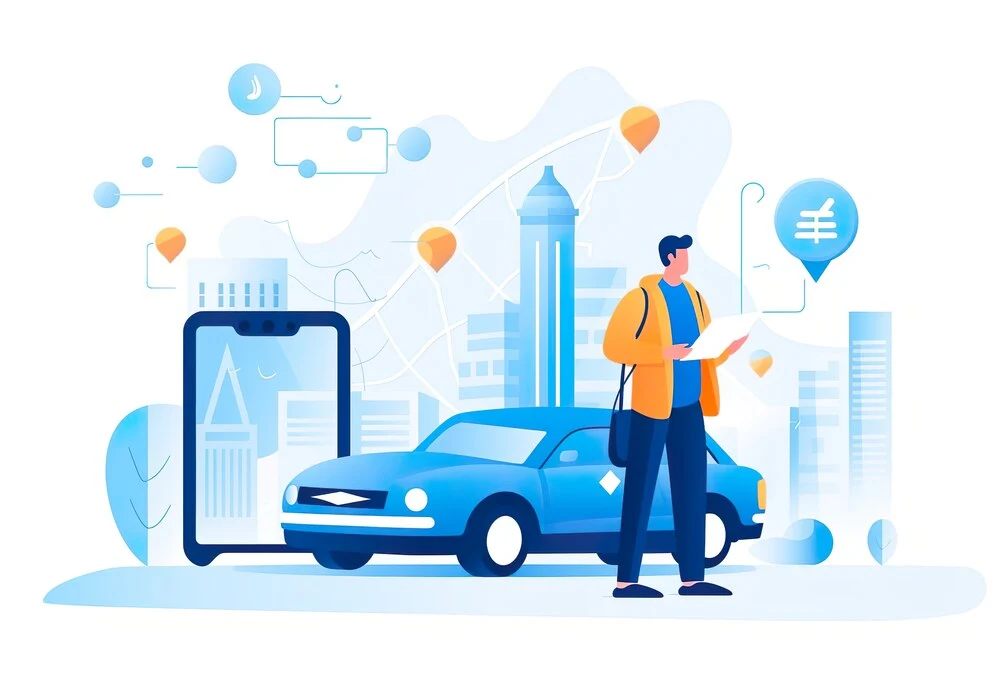
1What is a Ride-Hailing Service?
Ride-hailing is revolutionizing urban mobility, especially in developing countries like Nigeria. A ride-hailing service is essentially a digital transportation network company that connects riders with drivers through mobile apps or web platforms. Unlike traditional taxis, ride-hailing services operate on a real-time, on-demand model, where passengers can request a ride from their smartphones, and a nearby driver arrives within minutes.
This modern model of transportation eliminates the need for standing on street corners or haggling over fares. Everything is streamlined from booking the ride, tracking the driver's location, making payments, to rating the experience afterward. In countries like Nigeria where cities like Lagos and Abuja are plagued by traffic congestion and limited public transportation, ride-hailing offers a flexible and affordable solution to daily commuting woes.
The rise of smartphones, internet penetration, and digital payment systems in Nigeria has contributed significantly to the adoption of ride-hailing services. Giants like Uber and Bolt have paved the way, proving that there's a market demand and profitability. However, there's still massive room for new entrants, especially those who understand local market needs and can tailor features accordingly.
Appicial Technologies provides scalable ride-hailing app solutions, making it easier for entrepreneurs to enter this competitive space without starting from scratch. Their white-label taxi app solution is fully customizable, ensuring that Nigerian entrepreneurs can create a service that speaks to local preferences and economic conditions.
2Tools to Automate Your Ride-Hailing Service
Automation is the backbone of any successful ride-hailing business. In a world that runs on real-time data and instant gratification, having the right automation tools can significantly improve efficiency, user satisfaction, and profitability. Let's break down the critical tools needed to automate a ride-hailing service in Nigeria.
1. Real-Time GPS Tracking
Your ride-hailing app must offer real-time tracking. This feature allows passengers to monitor the driver's movement on the map, while the admin can oversee the entire fleet. It adds transparency and builds trust. For Nigerian roads, where directions may often be complex due to informal addresses, GPS accuracy is non-negotiable.
2. Automated Dispatch System
Gone are the days of manual ride assignments. An automated dispatch system uses intelligent algorithms to assign the nearest available driver to a passenger. This improves the average pickup time and helps maximize the number of rides per driver per day. This also keeps fuel consumption in check and boosts profitability for all parties involved.
3. In-App Notifications
Automated push notifications keep both drivers and passengers in the loop. From booking confirmation, driver arrival, trip start, to payment and rating everything can be communicated automatically. These messages can also be used for promotions and service updates.
4. Dynamic Pricing Algorithm
Nigeria's traffic is unpredictable. A dynamic pricing feature automatically adjusts the fare based on demand, time, weather, or special events. This not only ensures fair driver compensation during peak hours but also manages rider demand effectively.
5. Automatic Earnings Reports
Both drivers and administrators benefit from automated reports. Drivers can view their earnings in real-time, while admins can monitor the platform's financial health. With tools provided by Appicial, these reports are generated without any manual input, saving time and reducing errors.
Automation eliminates human error, reduces operational costs, and ensures a smoother user experience. Appicial's platform comes integrated with all these tools, allowing entrepreneurs to focus on growth and customer satisfaction rather than backend complexities.
3A Set of Ride-Hailing Apps
When launching a ride-hailing business, having just one app won't cut it. You need a complete app ecosystem that includes separate interfaces for passengers, drivers, and administrators. Here's a breakdown of what each app should offer.
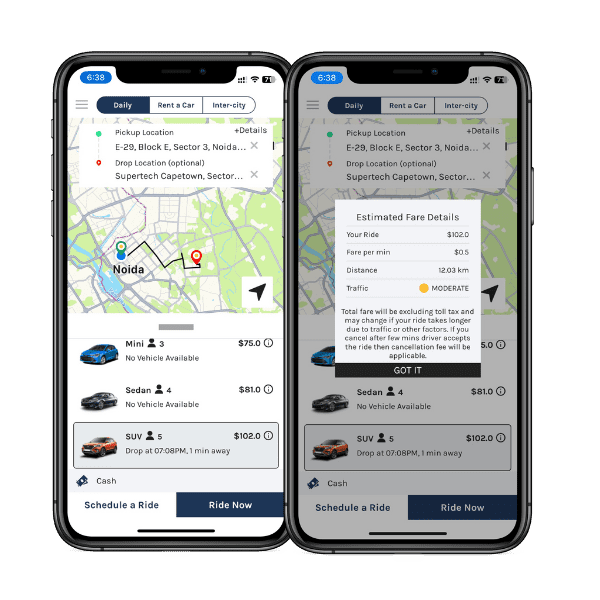
1. Passenger App
This is the heart of the user experience. It's what your customers interact with every time they book a ride. It must be simple, elegant, and responsive.
- User Registration: Let passengers sign up using email, phone numbers, or social accounts.
- Geolocation: Pinpoint pickup and drop-off locations with precision.
- Ride Scheduling: Allow users to book rides for later, not just on-demand.
- Fare Estimation: Provide fare transparency before the trip begins.
- Multiple Payment Methods: Integrate wallets, debit cards, and even mobile money options.
- Ride History: Let users access their ride logs and receipts.
- Ratings & Reviews: A feedback mechanism improves service quality.
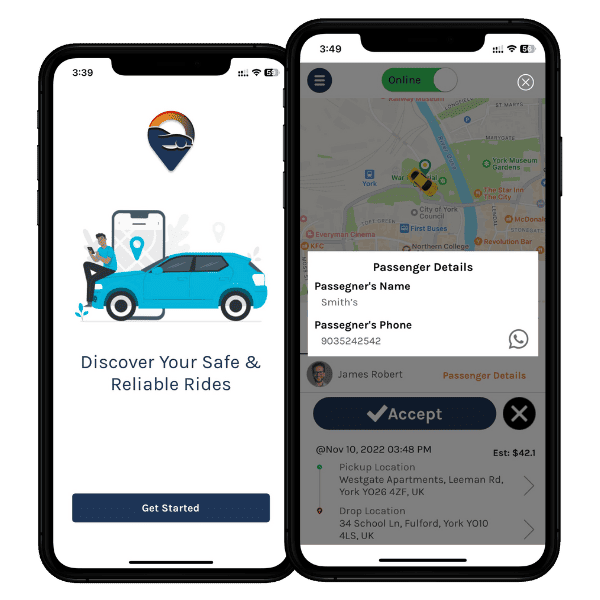
2. Driver App
Your drivers are your brand ambassadors. Their app must be designed for ease of use and functionality even in low-data or low-battery scenarios.
Key Features:
- Trip Requests: Accept or reject ride requests with one tap.
- Navigation Support: Offer real-time turn-by-turn navigation using local maps.
- Earnings Dashboard: Transparent earnings tracking and payout history.
- Availability Toggle: Enable drivers to go online/offline as needed.
- Notifications: Receive alerts for ride requests, cancellations, and messages.
- Profile & Document Upload: Upload licenses, insurance, and ID directly.
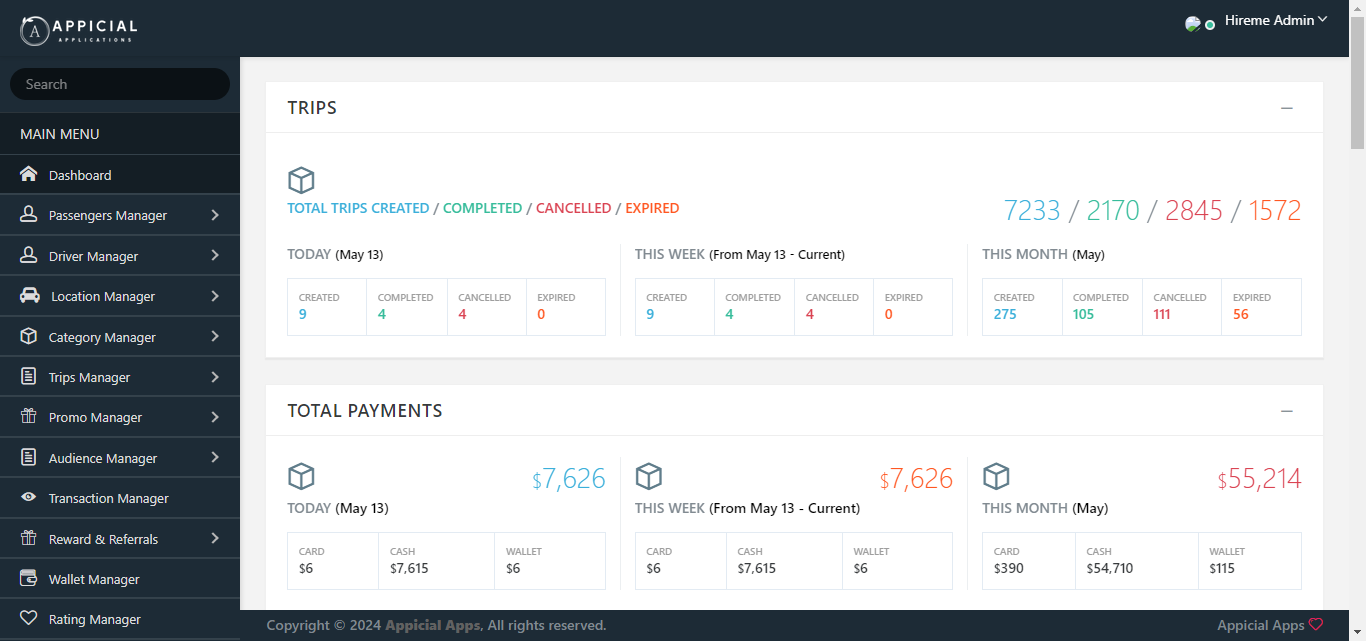
3. Admin Panel
The central nervous system of your operation, the admin dashboard, provides full control and oversight.
Key Features:
- User & Driver Management: View, approve, and manage user profiles.
- Reports & Analytics: Monitor trends, revenue, user activity.
- Fleet Management: See real-time fleet data including active drivers.
- Discount Management: Create promo codes, referral offers, and seasonal deals.
- Issue Resolution: Manage and resolve user complaints and support tickets.
4. Web App
A responsive web application offers accessibility for users who prefer or need to book rides from a browser. It mirrors mobile functionalities but is optimized for desktops and tablets.
Benefits:
- Corporate Bookings: Businesses often prefer web access for group or scheduled rides.
- Accessibility: Elder users or those with low-end smartphones may find it easier.
5. Website
Your website serves as your digital business card. It must inform, impress, and convert visitors into users or drivers.
Key Elements:
- Landing Pages for Riders and Drivers: Show benefits and onboarding process.
- SEO-Optimized Blog Section: Help rank on Google for local searches like "best taxi app in Nigeria."
- Support & FAQs: Help new users understand how your app works.
- Social Proof: Add testimonials, media mentions, and case studies.
Appicial's white-label solution comes with all of these modules fully developed and ready for customization, saving you from months of costly development.
4Must-Have Backend Tools
The real magic happens behind the scenes. Let's explore the critical backend tools that power a ride-hailing platform.
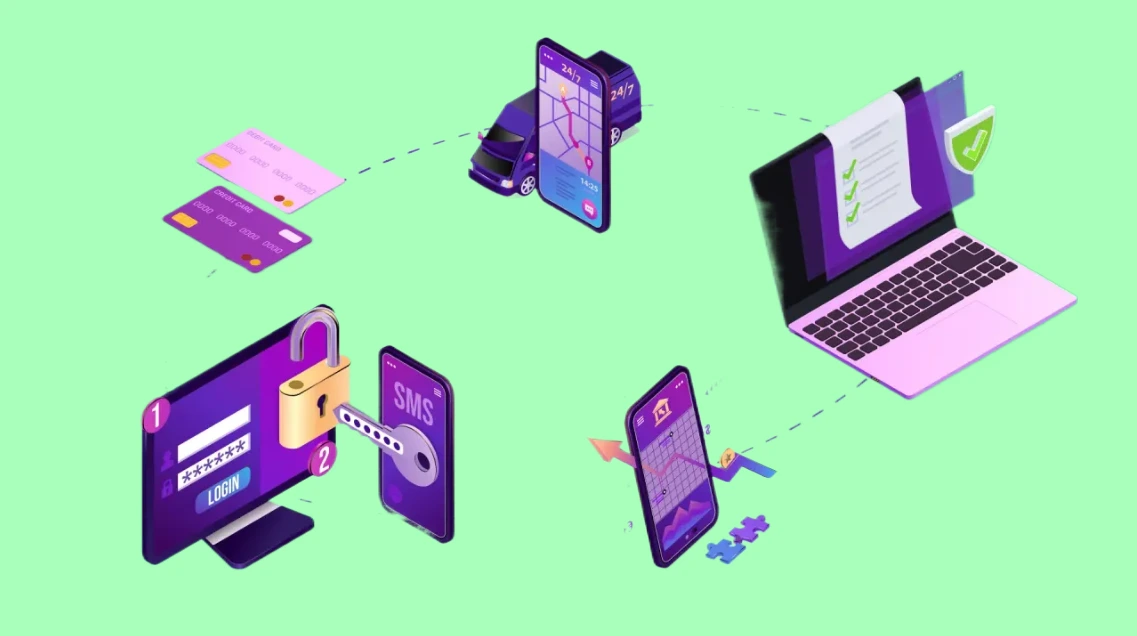
Accurate geolocation is vital in a country like Nigeria where formal addressing systems aren't always reliable. Tools like Google Maps, Mapbox, or OpenStreetMap offer dynamic routing, real-time traffic updates, and estimated time of arrival.
Appicial integrates with all major mapping APIs and even offers custom integration for local maps, ensuring your drivers never get lost.
Features Include:
- Email/Phone verification
- Social logins
- Two-factor authentication
- OTP verification for transactions
1. Customer Support Tools
Efficient customer service builds loyalty. A robust backend should allow seamless customer support integration.
Options include:
- Live chat (via Zendesk, Intercom)
- Email ticketing system
- Call center module
- FAQ bot integration
2. Marketing and Promotion Tools
Your backend should empower your marketing team with tools to launch and track campaigns.
Capabilities:
- Push notifications
- SMS & email campaigns
- Promo code generation
- Referral tracking
Appicial's admin dashboard includes a built-in marketing suite to keep your brand top-of-mind for users
3. Payment Gateways
- Paystack
- Flutterwave
- Interswitch
- Stripe
- Wallet systems
- USSD payment options
Appicial offers plug-and-play integration with all major Nigerian and global payment providers.
Also Read: Driving to Wealth: How to Become a Billionaire in South Africa's Taxi Business
5Fleet Management Tools
Managing a fleet efficiently can make or break a ride-hailing business, especially in a competitive and fast-paced environment like Nigeria's urban centers. Fleet management ensures that all vehicles are functional, safe, and being used optimally. Appicial provides advanced tools to simplify this complex task.
1. Vehicle Tracking
Real-time vehicle tracking is one of the cornerstones of successful fleet management. With GPS tracking, operators can monitor every vehicle's location, speed, and direction. This isn't just about knowing where the cars are, it helps optimize routes, identify traffic congestion patterns, and ensure that drivers follow approved paths. In Nigeria, where road safety and security are crucial, being able to track vehicles in real-time offers peace of mind for both passengers and platform operators.
Moreover, vehicle tracking can help reduce fuel costs, as it encourages drivers to avoid aggressive driving habits and unnecessary idling. It also supports emergency responses in the event of an accident or vehicle breakdown, allowing dispatchers to act swiftly.
2. Maintenance Scheduling
Just like any other business asset, vehicles need regular maintenance to perform well and last longer. Appicial's platform allows automated maintenance scheduling based on time intervals, distance traveled, or the number of trips completed. This keeps the fleet in good shape and avoids unexpected breakdowns during trips, which can hurt your reputation.
Scheduled maintenance includes oil changes, brake checks, tire rotations, and more. The system sends reminders to drivers or fleet managers, helping them stick to service routines and ensure maximum vehicle uptime.
3. Driver Management
Drivers are the face of your business, so managing them effectively is key. With Appicial's built-in driver management tools, operators can track driver performance, trip completion rates, customer ratings, and punctuality. You can also manage documents like licenses, background check reports, and insurance records digitally within the admin dashboard.
This system makes onboarding new drivers easy. It also provides a structured way to reward top-performing drivers or offer coaching to those falling below service standards
6Data Analytics Tools
In a competitive landscape, data-driven decisions separate thriving ride-hailing services from those that struggle. Appicial's robust analytics tools help entrepreneurs gather, analyze, and act on the most relevant data, leading to continuous improvement and business growth.
1. Customer Insights
Understanding your users is vital. Data analytics tools provide detailed insights into customer behavior, such as frequent travel routes, preferred payment methods, peak usage times, and more. These patterns help tailor your services to meet the specific needs of your user base.
For example, if data shows that most customers use the app early in the morning and late at night, you can optimize driver availability around those times. If many riders are choosing a certain location, consider placing more cars in that area.
Analytics also help in building personalized marketing campaigns. Sending targeted messages or discounts to users who haven't used the app in a while can re-engage dormant customers effectively.
2. Performance Metrics
Key performance indicators (KPIs) help measure how well your ride-hailing business is doing. Metrics such as:
- Ride completion rate
- Average wait time
- Customer rating scores
- Driver response time
can reveal a lot about your operational efficiency. These metrics are displayed in easy-to-read dashboards so that even non-technical entrepreneurs can make data-backed decisions.
Performance data can also highlight potential issues like driver shortages during peak times or underutilized vehicles. With this information, you can implement corrective actions promptly
7Cloud Services & Localization Tools
By using cloud-based infrastructure, your ride-hailing platform can easily scale as demand increases. Whether you're expanding to new cities or onboarding thousands of new users, cloud technology ensures smooth performance without system crashes or slowdowns.
Benefits of cloud services include:
- High Uptime: Your app is available 24/7, even during high traffic periods.
- Data Backup: Automatic backups keep your data secure.
- Real-Time Updates: Instant deployment of new features or bug fixes.
- Cost-Efficiency: Pay only for the storage and processing power you use.
Appicial's cloud-based architecture supports seamless expansion, so you can start in Lagos and scale to Abuja, Port Harcourt, or beyond without changing your tech infrastructure.
Localization Tools
Localization is more than translation. It's about making your service feel native to users. Appicial provides localization tools to adapt your ride-hailing app to:
- Local languages: Add Yoruba, Hausa, Igbo, or Pidgin interfaces for broader appeal.
- Local currencies: Support payments in Naira, and show fares in local denominations.
- Cultural norms: Customize UI/UX to reflect local behavior and expectations. This localized experience enhances user trust and satisfaction, leading to better adoption and loyalty.
8 Legal and Security Tools
Operating a ride-hailing business in Nigeria involves getting licenses, adhering to local transport regulations, and ensuring fair labor practices for drivers. Appicial's platform includes features that simplify compliance, such as:
- Digital Driver Contracts: Store and manage agreements electronically.
- Regulatory Reporting: Automatically generate reports required by local authorities.
- Taxation Integration: Ensure proper tax calculations and filings.
By staying ahead of legal requirements, you protect your business from fines, license revocations, or public backlash.
Security Features
Users need to feel safe to trust your platform. That's why security tools must be deeply embedded in your app.
Key security tools include:
- Driver Background Checks: Ensure all drivers pass identity and criminal checks.
- SOS Button: Allow riders to alert authorities or emergency contacts during distress.
- Trip Sharing: Let passengers share trip details with friends or family.
- End-to-End Encryption: Protect user data and payment information from hackers.
Appicial also offers fraud detection systems that monitor unusual activity like multiple accounts from one device or abnormal ride patterns, helping prevent abuse before it escalates.
Conclusion
Start a ride-hailing business in Nigeria requires a sophisticated, locally-adapted digital ecosystem, not just a simple app. Building this complex network of reliable passenger and driver apps, powerful admin controls, and optimized backend operations from scratch is a significant undertaking in terms of time, cost, and technical expertise. Achieving seamless user experiences, efficient fleet management, robust security, and compliance demands the right technological foundation.
This is precisely where Appicial Applications excels. As a leading taxi app development company, Appicial offers a comprehensive, white-label solution pre-equipped with the essential features and tools needed to thrive in Nigeria. Their platform is not only feature-rich but also specifically customizable for the local market, supporting Nigerian payment gateways, languages, and operational nuances. By partnering with Appicial, entrepreneurs and existing transport businesses can bypass lengthy development cycles and high costs, deploying a proven, scalable, and secure solution rapidly.
The opportunity in Nigeria's ride-hailing sector is undeniable. With Appicial Applications as your technology partner, you gain the competitive edge needed to navigate this dynamic market successfully. Choose Appicial to accelerate your launch, minimize complexities, and build a powerful, future-ready mobility brand tailored for Nigeria.
FAQs
Looking out to start your own venture like Uber ? Try out our HireMe Taxi Uber Clone, the easiest way to kick-start your taxi business.
Author's Bio

Vinay Jain is the Founder at Grepix Infotech and brings over 12 years of entrepreneurial experience. His focus revolves around software & business development and customer satisfaction.
Back to blog list




